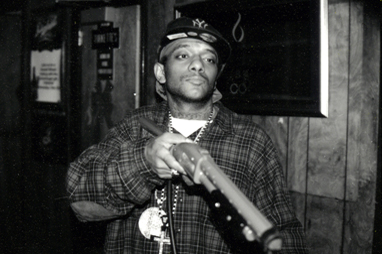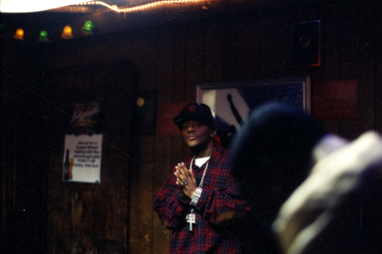With Prodigy recently getting knocked for gun possession, we found it ironic that we'd titled our Spring 2007 feature on him and his triumphant Return of the Mac album as "Hard Times." If only, dude. Read that feature after the jump and listen to Prodigy's recent comments on his sentence here.
When it comes to confessionals on wax, few get realer than “You Can Never Feel My Pain,” the final song on Prodigy’s 1999 solo album, HNIC. Over some lite R&B keys from an Angela Bofill record, the Mobb Deep member details his lifelong struggle with sickle cell anemia: 1974, motherfucker I was born with pain/ My moms and my pops passed it down to me/ So don’t talk to me about “Can I feel yours?”/ Cause I ain’t feelin you at all, your pain isn’t pure/ You cryin cause you broke from the projects/ That’s not pain, that's emotions, you a bitch/ I’m talkin bout permanent, physical sufferin/ You know nothin about that/ You just complain cause you stressed/ Nigga, my pain’s in the flesh/ And through the years that pain became my friend.
Ever since they were introduced to the world as axe-wielding post-pubescents on the cover of their 1993 album Juvenile Hell, Mobb Deep were never your average thugs. Their goth depictions of outer-borough life made albums like Hell on Earth and The Infamous East Coast classics, melding wild-out energy with an introspective uneasiness, both musically and lyrically. Where other groups would write a song about partying, the Mobb would compose “Drink Away the Pain.” Even when boasting about how they’d rock you in your face and stab your brain with your nosebone, there was always an underlying sense of claustrophobia and internal conflict that fueled the menace. New York got a nigga depressed, Prodigy declared on Infamous single “Survival of the Fittest,” so I wear a slug-proof underneath my Guess.
In the late ’90s and early ’00s, when the group polished up their songs and videos to keep pace with the rest of an increasingly jiggy New York City, they lost the dusted-out loops that helped define their earlier work but maintained their unhinged aura as dudes who might pop Cristal but wouldn’t hesitate to break the yellow bottle and cut you with it. Much of that spirit could be attributed to Prodigy. From his appearance—skinny, tattooed and wifebeater-ed, accessorizing only with bandanas, doo rags and giant chains—to his progressively more abstract and paranoid lyrics that were peppered with references to melancholy and self-medication, he cultivated a complete mythology around not giving a fuck. On songs like HNIC mission statement “Keep It Thoro,” he would even lay it out in those exact, raspy words: You just a groupie/ Oh you gangsta? Then shoot me/ Who gives a fuck, really/ I miss my nigga Twin, kill me/ So I can join the rest of my folks, up in the heavens. It was a casual admission, a glimpse into Prodigy’s psyche made more shocking because of its offhandedness. It didn’t matter whether or not you believed what he was saying—it worked because he believed it.

Last year, Prodigy tattooed a script “G-Unit” logo on his right hand, a symbolic gesture commemorating Mobb Deep’s signing with the crew (50 Cent got the Mobb insignia inked on his wrist in return), following a one-album stint on Jive records in 2004, a series of abortive indie projects following 2002’s Infamy LP, and Jay-Z’s vicious diss track, “Takeover.” That song was first performed at Hot 97’s Summer Jam concert in 2001, complete with Jay’s now-legendary Jumbotron projections of a nine-year old, sequin-clad Prodigy photographed at his grandmother’s dance school, along with the devastating line, You was a ballerina, I got the pictures, I seen ya.
Blood Money, the group’s G-Unit debut, was supposed to be a true comeback album for Mobb Deep. But the final LP was a muddled affair, heavy on nondescript club beats and glossy, out-of-character collaborations with 50 like “Outta Control” and “Have a Party.” Sales-wise, the disc was an even bigger disappointment, failing to sell even 300,000 copies despite heavy promotion and three expensive videos. Even the gospel-tinged “Pearly Gates,” the album’s one real standout, was marred when Prodigy’s lyric Tell that nigga Jesus I’ma see him when I see him/ And when I see him, I’ma beat him like the movie was censored on retail copies of the disc. “I was happy with the music we put on there and gave to the world,” says Prodigy, tersely. “After Blood Money I just wanted to keep it moving, you know what I’m saying? Now we on to the next project. That’s how we work.”
This past winter, Prodigy linked up with longtime collaborator Alchemist to record some new songs, ostensibly for an HNIC follow-up. “We were watching the old video for [Capone N Noreaga and Mobb Deep’s] “LA, LA,” where P had the gold Mac 10 chain around his neck,” recalls Alchemist. “We were like, ‘We gotta bring back that feeling.’ Not bring back the old music, because we never go backwards with that, but if we could capture the old vibe….” The duo recorded what has become their joint album Return of the Mac in two weeks of intense in-studio inspiration. “We was on a mission,” says Prodigy. On the new album, the instrumentals blend throwback drum breaks and evocative samples from soundtracks like James Brown’s Black Caesar score and the Quincy Jones Ironsides siren used throughout Kill Bill, along with vocal snippets of Biggie, Ice Cube, Tupac, Big Pun and others—all talking about Mac 10s—sprinkled in for flavor. The result is a cinematic, imaginary Gotham City that doesn’t recall any era in particular, and Prodigy uses it as a lightning bolt to electrify a grimy, Infamous-style flow that sounds as vital coming out of his lungs as ever. “[Return of the Mac] was just an excuse for me and P to dumb out,” says Alchemist. “Every song is about a Mac 10 loosely, every song is about New York loosely, we kind of threw a bunch of things in the pot and came up with this body of art that is dope to me.”
“We were like, ‘We gotta bring back that feeling.’ Not bring back the old music, because we never go backwards with that, but if we could capture the old vibe….” -The Alchemist
Return of the Mac was originally intended as a mixtape, but a self-financed video by Prodigy changed all that. “He just went and did it, he didn’t tell me about it,” says Alchemist. “He didn’t put out any press releases, or send any emails like, ‘Yo, come check the new Prodigy video.’ He straight put it on YouTube out of nowhere, and people started telling their friends. That’s what set this off on a bigger scale.” The clip, for “Mac 10 Handle,” featured a sweat-drenched Prodigy in a filthy apartment, swigging liquor and wiping fingerprints off bullets. He swings knives at demonic hallucinations in the mirror, rapping I sit alone in my four-cornered room staring at candles/ High on drugs. It was a heavy video, made more intense not only by its low-budget production values, but by the life-versus-art emotions that it stirred. Prodigy embracing the darkest recesses of his persona for musical inspiration was not a new development, but choosing to depict himself at rock bottom following so many personal attacks and professional disappointments gave the song real pathos. “It’s just another joint,” Prodigy says. “To me, it was just another day in the studio. But I’m happy if it makes people feel a certain way.” Alchemist is more succinct about what he sees as the video’s appeal. “I don’t think [Prodigy] is offended when people are like, ‘Yo, that video is hot when you are all fucked up,’” says the producer. “He’s an artist, he grew up in a family of artists, he’s been in movies before. P doesn’t sit in the crib all day sweating, spitting out Henny on the wall. But for the sake of the video it was dope. It was like, ‘I am so glad you are stabbing the couch instead of walking into the club with a bunch of bitches.’”

Return of the Mac is going to be distributed by Koch this spring, but has already been used as a point of contention in the high-profile war of words between 50 Cent and Koch-affiliated Cam’ron, with Prodigy’s sales figures and contract details discussed in heated on-air radio conversations between the two. “People follow our every move, what we’re doing on the business side, everything,” says Prodigy. “It’s nothing new.”
Regardless of whether or not this album—or the forthcoming HNIC sequel—brings Prodigy back to the gold and platinum heights of earlier Mobb projects, cutting to the bone and reminiscing with Alchemist has certainly revived his creativity. On “Legends,” one of the album’s final tracks, Prodigy spits over a Dionne Warwick sample last flipped by J Dilla on Donuts, and its one of his most self-aware storytelling moments to date: Dirty little fuck/ Learnin how to aim my pee/ Older niggas in the hood used to try and thug me/ Till pops gave me a knife, told me handle my things/ And if not, when I came back, he would handle me/ I put my first li’l fear in niggas/ I was gassed/ Started hangin with the others that was on the same shit/ Had my first taste of gunfire early in my years/ Gang fights, we was jumpin niggas/ We was just kids. Whereas the rest of Return of the Mac celebrates the nihilism of The Infamous, “Legends” adds a reflective edge to P’s usual tone. “We used to cut out of school and go to Coney Island to record songs almost every day,” says Prodigy. There’s warmth in Prodigy’s tone when speaking on the Mobb’s wild teenage days of fake IDs. “You grow out of a lot of shit,” he says. “But you can never change.”
Prodigy, "Mac 10 Handle"
Prodigy, "Stuck on You"
Prodigy, "7th Heaven"
Mobb Deep, "Survival of the Fittest"
Mobb Deep, "Shook Ones, Pt. II"
Prodigy, "Summer in the City"
Prodigy, "In the Smash"


